-
FAITHFUL/DE NOS FRÈRES BLESSÉS (Hélier Cisterne 2020)
HÉLIER CISTERNE: FAITHFUL/DE NOS FRÈRES BLESSÉS (2020)
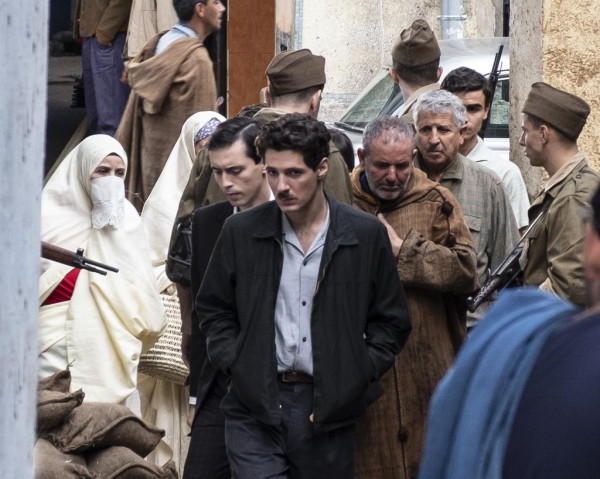
VINCENT LACOSTE (CENER) IN FAITHFUL
The true story of a young Frenchman executed in the war for Algerian independence
In the retitled Faithful (De nos frères blessés, "Of Our Wounded Brothers"), Fernand Iveton (Vincent Lacoste) is a French citizen born in Algeria, then a French colony, who joins the war for independence with Arab and French comrades. He is caught planting an unexploded bomb in his workplace (he is a machinist) in Algiers and eventually is tried and executed for this action by guillotine, a procedure that is shown in some detail . This touching and in some ways beautiful story happens to focus on a place and time covered by one of the best films ever made, Gillo Pontecorvo's Battle of Algiers. Why bother? Director Héllier Cisterne can't match the unforgettable tumultuousness and precision of Pontecorvo's film.
One question is the casting. Neither Vincent Lacoste as the young Fernand nor Vicky Krieps as his wife Hélène (Vicky Kreps), a veteran of Polish oppression, makes a strong impression. When at one point Hélène refers to Fernand's "slightly goofy smile" ("ton sourire un peu débile") it reminds us that Lacoste began as a comic actor playing a gauche, pimply teenager in his debut film The French Kissers/Les beaux gosses, who fit the role well. In the twelve years that followed he has become a well known, admired, and very prolific actor with 35 credits. Lately he has taken the place of Louis Garrel as Christophe Honoré's muse, and was acknowledged to be a great success in Honoré's semi-autobiographical and pretty serious Sorry Angel/Plaire, aimer et courir vite. This remains his most complex and successful role so far and shows he can do serious work in the right kind of context. But he still seems a bit goofy, with a toothbrush mustache here, despite the solemnity of the sad events depicted, and the character of Fernand is far from fully developed.
Screenplay and direction don't collaborate here with Lacoste to deliver a clear and memorable piece of work. Fernand Iveton's story shows only indirectly the brutality of French colonial repression in Algeria. The police tortured pirsoners, but the film doesn't show the torture, only bruises. Fernand's comrades plot other actions, but we don't see them. Fernand and his French "brothers" are the champions of Algeria and the Arabs, but the film waits 30 minutes before introducing a scene that has Arabs as the main movers in it.
The screenplay stutters and is confusing. It begins with Fernand on a brief trip to Paris for medical tests, where he falls in love with the self-assured Hélène, who has escaped from Iron Curtain Poland, and they fall in love with each other's dedication to principles. Hélène, later sometimes to her regret, agrees to go back to live in Algiers with Fernand, bringing her teenage son Jean-Claude (Jules Langlade, who hasn't much to do). The story, unwisely, is depicted in the screenplay with flashbacks in between excerpts from Fernand's trial, which drags out a procedure that notably was, in teal life, very rushed. Along the way the complexities of Fernand's commitment and Hélène's regrets tend to get lost. Meanwhile as the personal story fails to emerge with sufficient passion and complexity, one feels the detail of Pontecorvo's film, the intensity and complexity of the Algerian war for independence, slipping by somewhere, not quite perceived.
Faithful/De nos frères blessés ("Of Our Wounded Brethren,") 96 mins., according to IMDb has one festival debut only at the Festival International du Film de Saint-Jean-de-Luz, and opened in French cinemas Feb. 24, 2021. Screened at home online for this review as part of the all-virtual Rendez-Vous with French Cinema Mar. 6, 2021.
Last edited by Chris Knipp; 03-10-2021 at 10:54 AM.
-
GAGARIN/GAGARINE (Fanny Liatard, Jérémy Trouilh 2020)
FANNY LIATARD, JÉREMY TROUILH: GAGARIN/GAGARINE (2020)
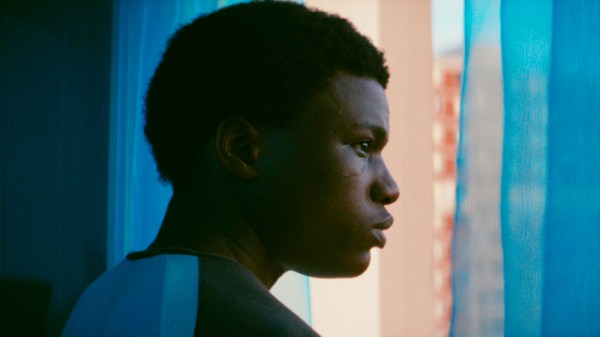
ALSENI BATHILY IN GAGARINE
Takes the ordinary and turns it into wonders
Thanks in part to cinematographer Victor Seguin, Gagarin is a film that astonishes, and it starts with a commonplace of contemporary French movies: the big, doomed ghetto "cité" of the banlieue. Here, thanks to the focus on the big soulful black adolescent (Alseni Bathely) called Youri for the cosmonaut, Gagarin, for whom the building complex is also named, the focus changes. Instead of being about hoodlums and gang wars, this is about the cité itself, and the varied community it contains. Eventually we enter into the imagination of Youri, who has dreamed of being a cosmonaut, and for a while, the whole movie takes flight into a sad but glorious fantasy.
Directors Fanny Liatard and Jérémy Troulh are weaving wonders in a very cinematic way here. At first, as we meet some of the personalities connected with Youri, he tries to use his precocious engineering skills to improve the wiring and lighting and bring the building complex up to code so there is no excuse to demolish it. But while the public spaces pass inspection, the flats don't, and eventually everyone is evacuated, except Youri. Gone is Houssam (Jamil McCraven), once Youri's constant sidekick. His mother has withdrawn her promise to take him in with her new man and younger child. Diana (Lyna Khoudri), who communicates with Youri in a secret universal language (Morse), also remains for a while and a romance blooms.
Youri's secret habitation lodged in the building is like a space ship. The filmmakers go to town creating a dreamy world of improvised technology, including fantastic electrical gadgets and a greenhouse growing vegetables. But everyone is gone now. Diana's Roma community's local squat is destroyed and she must go off with them. Even the rough, not so tough drug dealer Dali (Finnegan Oldfield) runs off after getting beaten by thugs. The pungent cameo of iconic French star Denis Lavant (who deals in wiring and spare parts) is a fading memory.
This is about Youri, but always also about Gagarine, the building. Hence the demolition is an event former inhabitants gather to witness. Only Diana knows Youri is still there and must be saved. As the Variety review points out, this movie was woven out of a real event, the August 2019 demolition of the huge Cité Gagarine, a 370-apartment housing project in Ivry-sur-Seine on the outskirts of Paris that interestingly was built in 1961-63 by the Communist French section of the Workers International. As he wrote, this is a "wondrous" debut feature the physical reality of whose setting gives it such a "crackle of authenticity" that its "starry-eyed metaphysics" seem "uncannily plausible" as well. Jonathan Romney's Screen Daily review predicts this movie's "conviction and chutzpah, plus often dazzling execution, will chime with younger adult audiences." This is a touching, beautiful, and thoroughly original film about community, ingenuity, and dreams. The red brick Cité Gagarine is gone, but the film's quietly vibrant young star Alseni Bathely will doubtless live on to grace many more features.
Gagarine/Gagarin, 95 mins., was a Cannes Marché selection Jun. 2020. Its many other international festival appearances included Berlin, Zurich, Hamburg, Moscow, Cologne, Bordeaux, Athens and Busan. Now a Cohen Media release. Screened for this review as part of the all virtual New York-based Rendez-Vous with French Cinema Mar.6, 2021.
Last edited by Chris Knipp; 03-31-2022 at 05:30 PM.
-
MARGAUX HARTMANN/L'ÉTREINTE (Ludivic Bergery 2020)
LUDIVIC BERGERY: MARGAUX HARTMANN/LÉTREINTE (2020)

VINCENT DEDIENNE, EMANUELLE BÉART IN L'ÉTREINTE
Emanuelle Béart as a recent widow rebooting her life
Its French title meaning "the embrace," this film is largely a one-hander, but we're in good hands with the beautfullly aging Émanuelle Béart as the lead Margaux, a recent widow set up outside Versailles chez her currently off traveling half sister while she attends grad school in German lit, for which her character is well prepared because she had a German parent. She is adopted by a very lively group of younger fellow masters candidates, including a gay pal, Aurélien (an appealing Vincent Dedienne) who becomes a kind of instant confidante. It gets complicated with her dashing 50-year-old teacher (Tibo Vandenborre, Belgian Flemish posing as German here), and then she enters the heartbreak and frustration of computer-dating and has one or two adventures.
Here is a Rendez-Vous film not about a minority or an important social issue. We watch it because we like watching a beautiful and famous actress pretending to be someone not quite so fortunate and taking things in stride. It's a circular plot line, starting and ending on a train. At film's end, Margaux has abandoned her academic plans and is going back in the opposite direction. Her brief period of nutty passion when online dating leads her to a would-be sexual affair with a classical trombone player has reawakened her sexuality and joie de vivre, but where her life is going to go, we don't learn; and what does it matter? This is, nonetheless in its way an assured debut for director Ludivic Bergery, who never gets in the way of Béart's seasoned beauty and watchability.
/Margaux Hartmann/L'étreinte ("The Embrace"),100 mins., debuted at Angoulême Aug. 28, 2020. No French theatrical release. Screened at home online for this review as part of the all-virtual 2021 Rendez-Vous with French Cinema, Mar. 6, 2021.
Last edited by Chris Knipp; 03-07-2021 at 12:42 PM.
-
SHOULD THE WIND DROP/SI LE VENT TOMBE (Nora Martirosyan 2020)
NORA MARTIROSYAN: SHOULD THE WIND DROP/SI LE VENT TOMBE (2020)
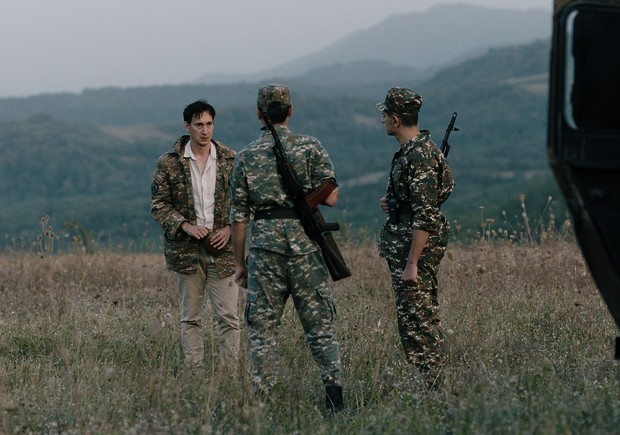
GRÉGOIRE COLIN (LEFT) IN SI LE VENT TOMBE
A French inspector visits a closed airport near a war-torn region
Grégoire Colin, the iconic young shirtless hunk in Beau Travail and generally cool dude in many of Claire Denis' other films as well (a total of six counting a new one), 45 now, appears in this new film in a different, neutral role as a man traveling around to a little known country. He's not neutral for the inhabitants, because in the film he is some kind of international inspector, and his decision about reopening an airport, near a no-fire zone dating from the Kosovo war, would put this little country, populated by Armenians, in the public eye, or leave it forever off the radar.
This visit to the disputed landlocked region of Nagorno-Karabakh, between Armenia and Azerbaijan and inhabited by Armenians, is an eight-hour drive from the nearest airport. (Director Nora Martirosyan is, I imagine, Armenian herself.) Alain Degage (Colin) arrives by long-distance taxi with a suitcase, in a rumpled suit. The Stepanakert Airport is an oddly designed, very real place. Also real perhaps is the little boy who walks improperly across the airport runways getting the water he goes around selling drinks of; and the eccentric old shepherd; and the unruly boys who at one point don uniforms and start firing live ammunition. There is also a patriotic airport official, and a pretty woman announcer for the local TV station, who wants to report on Alain's visit before it is proper. A romance does not develop. This is a staid film, and a slow-moving one, though it has some well-placed excitement during the last twenty minutes that changes everything.
I've been a fan of Grégoire Collin since, at age 17, he starred as a boyish con man in Agnieszka Holland's 1992 Olivier Olivier, and his Claire Denis films are not to be missed. There are only a couple of interviews with Grégoire Colin on YouTube. In one of them he is asked why he took on a particular role and film and he answers (in French), that he doesn't get that many job offers so he has to take what he can get. Agreed that being sometime muse of Claire Denis wouldn't guarantee an income, but he has 71 credits, counting TV series as well as a few shorts, so he must get asked to say yes pretty often.
This film may seem of rather specialized interest; but it, like the airport in the story, may bring beneficial attention to an obscure war-torn region. Oddly, Kurt Brokow points out in his Independent review that just this film was about to open last fall at Cannes Azerbaijan's culture ministry tried to ban it from festival showings both in France and Estonia. But, he says, "neither fest caved, and Should the Wind Drop became the first Armenian film since 1965 shown at Cannes."
Should the Wind Drop/Si le vent tombe, 100 mins., in English, French, Armenian and Russian, was a Cannes 2020 selection. Screened at home online for this review as part of the 2021 virtual Rendez-Vous with French Cinema (Film at Lincoln Center; UniFrance).sometime m
Last edited by Chris Knipp; 03-10-2021 at 02:06 AM.
-
SLALOM (Charlène Favier 2020)
CHARLÈNE FAVIER: SLALOM (2020)
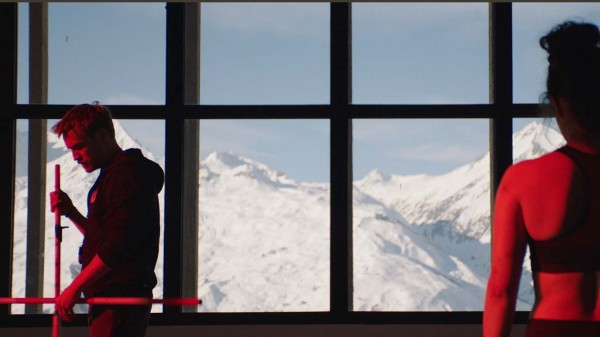
JEREMIE RENIER, NOÉE ABITA IN SLALOM
The illicit world of a ski coach and the teen girl star he loves too well
This compact little film is good at focusing on its 15-year-old girl ski trainee Lyz (Noée Abita), who's completely in thrall to her verbally abusive, soon-to-be sexually abusive coach, Fred (Jérémie Renier, the Dardennes brothers' once blond and youthful darling, gnarly and unrecognizable here but as intense as ever). He is very mean to her verbally, but then she wins and he's grudgingly approving, and she's hooked: the win is a high in itself. And how could she do it without him, since he is the linchpin of the framework of training and competition that enables the wins, and could lead on to the Olympics, from what he says?
The film smoothly intensifies its focus, as Fred isolates Lyz. Her emotionally rather distant or at least very retrained mother (Muriel Combeau) is already away in Marseille for a job, leaving Lyz to fend for herself at home. Now Fred removes Lyz's teammate and friend Justine (Maïra Schmitt). Then he gives her special favors, top of the line skis from a sponsor, with his wife Lilou (Marie Denarnaud) standing approvingly by. Then Lyz wins big - champion of France - and Fred is ecstatic, and the real abuse begins, the sexual inappropriateness. Lyz turns on the boys on the team too, it's worth noting; but they haven't the access Fred has, and don't matter. She is inexperienced, ignorant of sex, even about her period. When Fred speaks to her intimately and helpfully about that, he takes the place of her mother. Better wi-fi for homework consultations as the excuse, Fred moves Lyz into his house.
As they become more intimate - and this is the film's subtlety and balance - Fred becomes more vulnerable, admitting in a key scene that his own ski career would up a total failure due to injuries and he had nothing. "Nothing?" "There's you." So in a way she means everything to him, too, as he dominates her world,and this is almost as much a secret love affair as it is hidden abuse, not that it doesn't remain abuse. It's complicated, okay? And lest that seem a copout, consider this: such complexity, and the frank details, along with the authentic settings in the French Alps and above all the high caliber of the cast, especially Abita and Renier, are all things that make this much more than a TV movie, even if its trajectory is predictable. About that, Jordan Mintzer in his Hollywood Reporter review suggests (as can be said of the greatest classic stories) that it's not the what but the how of the telling that counts here. But one can also say as Peter Bradshaw does in his Guardian review, that this film ends its story too soon and doesn't fill in enough background (what happens to Fred, and how many teen girl ski protégés has he gotten intimate with before?). There are some quibbles. The final moments seems like a scene from a movie, not from the real life of a top athlete. Perhaps the director, who says this is based on personal experience, had gone as far as she could bear. But much of this film works well, and this is a strong debut fearure for Favier on a timely topic.
Slalom, 92 mins., was a Cannes 2020 official selection, and debuted at Angoulême, included in seven other festivals in both Europe and Asia. A Kino Lorber release in the US, it was screened for this review at home as part of the all-virtual FLC-UniFrance 2021 Rendez-Vous with French Cinema on Mar. 7, 2021.
Last edited by Chris Knipp; 03-10-2021 at 02:04 AM.
-
SPRING BLOSSOM/SEIZE PRINTEMPS (Susanne Lindon 2020)
SUSANNE LINDON: SPRING BLOSSOM/SEIZE PRINTEMPS (2020)
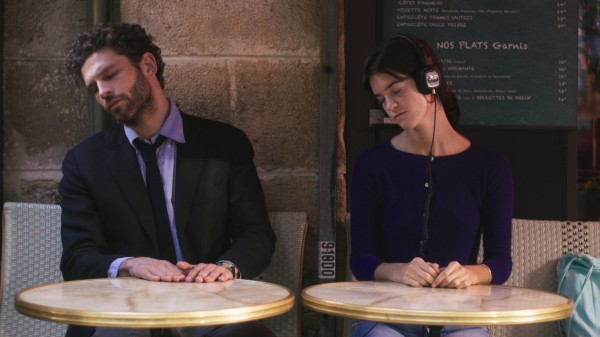
ARNAUD VALOIS, SUSANNE LINDON IN SEIZE PRINTEMPS
A light French take on May-December romance
May-December with a difference, because in this film Susanne (writer-director Susanne Lindon, now 20) is a mature 16 and Raphaël (Arnaud Valois) is a youthful 35 and the guy doesn't seem to an older viewer very old himself. Not at least till, that is, we do the arithmetic and realize Raphaël's 19 years Susanne's senior and thus more than twice her age. Yet Raphaël seems to approach Susanne in a sweet, courtly manner, like a sublime platonic object and the affair never (apparently) becomes sexual and seems determined not to.
It's no mystery why she'd fall in love with him. He's handsome and a bit (but not too) brooding, with a nice close-cropped beard and curly hair. It's not so clear why he'd fall for her. Out of politeness, out of boredom, because she's cute (rather like a young Charlotte Gainsbourg) and shy but poised, with an authentic smile. For him it's a beautiful but impossible flirtation. For her it's wonderful, until it's too much.
Thus somehow on the face of it Lindon avoids #MeToo issues - which may be provocative, nowadays, in itself. But in doing so, she gives us something simple and classic if also, because the writing is a little juvenile and the film is short and ends abruptly and is not just admirably minimalist as it wants to be, ultimately a bit sketchy and wan. But, however a product of privilege, it's also a talented debut that hints of more and hopefully better to come when the precocity blends with experience.
Is this a platonic relationship - or are the hand and head dances in unison, as stylized as something in a Eugène Green film, a way of symbolically reenacting foreplay and sex? The musical and dance numbers in the film at least are its way of expressing how the emotions soar.
I was reminded of a long-ago Paris literary hit that came to the US when in the mid-fifties, at only 18, Françoise Sagan published Bonjour Tristesse, her instantly famous precocious short novel about the 17-year-old Cécile who has a summer affair in front of her indulgent, wealthy parents with a 20-something man on the French Riviera. Both Bonjour Tristesse and Seize printemps ("Sixteen Springs" a title redolent of John Hughes) have an air of privilege, in the works themselves and the works' origins from a world of well-off Parisian Bobo's ("bourgeois bohemians"), or better in this case, since Susanne Lindon, who wrote this at 15 and has produced and starred in it at 20, is the daughter of the two most famous and admired actors of France, Vincent Lindon and Sandrine Kiberlain. Doubtless they live in a "grand appartement bourgeois," using the term not as it's bandied about in rental listings but in its grander sense of a big old many-roomed high-ceilinged apartment in one of the best parts of Paris - in Susanne's case in the 18e arrondissement, Montmartre, a short walk from the Théâtre de l'Atelier where Raphaël is acting in a play when Susanne spots him at the nearby café and begins to spy on him.
In this short feature Susanne (the writer-director) is a cute, boyish girl with her own style of tight faded jeans and mannish white shirts. She is bored with her lyçée, with her classmates, and with boys, which at a p;arty she rates all as 5's, on a scale of one to ten. So she looks for someone older and quickly finds him. But she will not even ride on his new red Vespa with him, a fair indication that she's not planning to go to bed with him either, that more dangerous ride. In the current atmosphere, when so many male abusers have been unmasked, we may forget the old French tradition of an older person (granted, more often a woman with a young man) teacher a youth the ways of love.
Susanne, in the film, makes out with a mirror like the boys in French Kissers/Les beaux gosses (Vincent Lacoste's debut), perhaps the sexiest thing in the movie. Her actual kisses from Raphaël or her are courtly pecks, infinitely sweet, but carefully restrained, hardly more than merely more fraught versions of the air-pecks she and all her girlfriends exchange outside the lycée every day. She consults with her dad (Frédéric Pierrot; with him and her mom Florence Viala and sister Rebecca Marder she gets on perfectly) about whether men like skirts better and starts wearing them, and trying to put on eye makeup (with messy results at first). The chaste trysts proceed: sharing a sugary drink, meeting for breakfast, a walk (with the dance moves), a visit to the theater stage (with the dance moves cozier). And then Susanne gets cold feet, and cries to her mom. And boom! It's over.
There is a strong feeing that more could have been done with this; that its success is a seamless mixture of tasteful restraint and limited imagination. But the classic French taste is there. Privilege is also nurturing of talent. Françoise Sagan never did anything else as well known as Bonjour Tristesse. For Susanne Lindon hopefully this may be only the precocious beginning.
Seize printemps/Spring Blossom, 73 mins., was a 2020 Cannes selection shown at Angoulême in Sept.; shown in at least 15 other international festivals including Toronto, Athens, Hamburg, Mill Valley, Chicago, Busan, Vienna and closing film at Glasgow. In the US, a KimStim release. Screened online at home for this review as part of the all-virtual 2021 Rendez-Vous with French Cinema, Mar. 8, 2021.
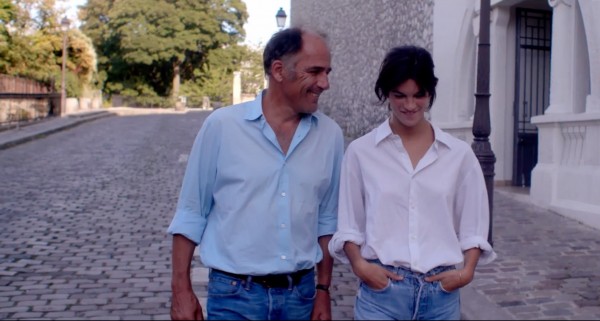
FRÉDÉRIC PIERROT AS THE FATHER, SUSANNE LINDON AS THE DAUGHTER IN SPRING BLOSSOM
Last edited by Chris Knipp; 03-09-2021 at 03:17 PM.
-
LIFELINES/SI DEMAIN (Fabienne Godet 2020)
FABIENNE GODET: LIFELINES/SI DEMAIN (2020)

LUCIE DEBAY, JULIE MOULIER IN LIFELINES
In search of lost time
When we meet the protagonist, Esther (Julie Moulier, who also appeared in Fabienne Godet's 2013 and 2018 features]) has been drinking for ten days and winds up in the hospital because she can't deal with being dumped by her boyfriend. Then she receives a journal, source unknown, about an 18-year-old devastated when she survived a motorcycle accident her boyfriend died in.
This meditative road picture takes us along with Esther as she forgets her sorrow by trying to track down what happened to this young woman, who apparently ran off and may be traceable to Toulouse. Moulier has a funky, soulful quality; her face looks lived-in, perhaps a drinker's face, though she turns out to be trim and energetic. Esther leaves behind her best friend, Elena (Lucie Debay), even though Elena's cancer has come back. Elena insists she feels fine and she wants Esther to track down this story. Moulier's lived-in quality makes her relatable. If you go with the flow, this is a watchable picture. It takes us to Spain and then to Lisbon, where there is a little girl called Antonietta who goes to the French school and, eventually, the name of the lost girl and her identity is revealed.
Esther is a translator who wanted to be a writer. When she winds up in Spain she speaks fluent Spanish. She also has a stoicism that she needs when a handsome young hitchhiker she was traveling to Spain with doesn't show up the next morning and then her car dies on a remote road and her bag disappears later when she's begun hitchhiking. The handsome young man is played by Arnaux Valois, also the love interest in another Rendez-Vous '21 film, Susanne Lindon's Spring Blossom.
You may guess the surprise ending before it comes, and before that this bracing journey may start to feel futile. But as a place-marker, and thanks to Moulier, and Godet's dp Marie Celette (also the dp for the 2018 film) and surroundings that don't feel conventional, Lifeline has a certain offbeat appeal.
Lifelinea/Si demain, 85 mins., debuted at the Arras Film Festival Nov. 2020. It was screened at home for this review as part of the all virtual Mar. 2021 Rendez-Vous with French Cinema. It is unreleased.
Last edited by Chris Knipp; 03-09-2021 at 11:28 PM.
 Posting Permissions
Posting Permissions
- You may not post new threads
- You may not post replies
- You may not post attachments
- You may not edit your posts
-
Forum Rules





 Reply With Quote
Reply With Quote







Bookmarks